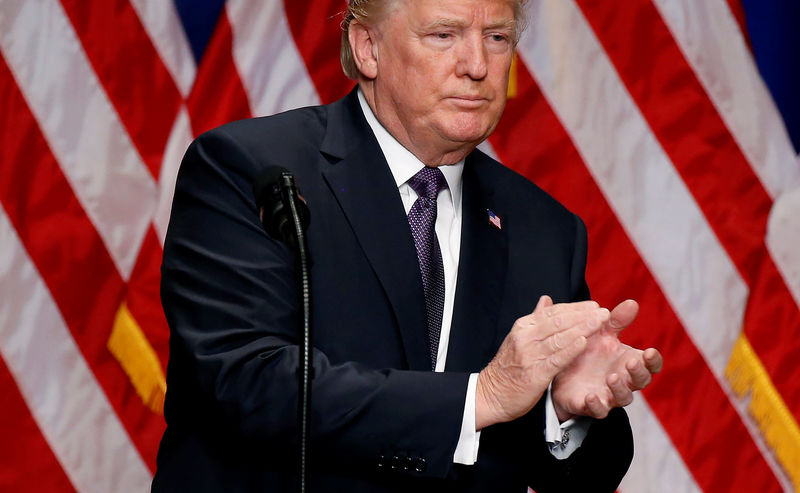 © Reuters. U.S. President Donald Trump claps after delivering remarks regarding the Administration’s National Security Strategy at the Ronald Reagan Building and International Trade Center in Washington D.C
© Reuters. U.S. President Donald Trump claps after delivering remarks regarding the Administration’s National Security Strategy at the Ronald Reagan Building and International Trade Center in Washington D.CBy David Lawder
WASHINGTON (Reuters) – U.S. President Donald Trump’s new security strategy bolsters the case for trade actions to protect U.S. economic interests on national security grounds, including possible import tariffs on steel and aluminum, a senior Trump administration official said on Tuesday.
The strategy document released on Monday did not specifically mention the Commerce Department’s “Section 232” investigations into whether rising steel and aluminum imports represent a threat to national security. With recommendations due in January, the probes could lead to broad tariffs or import quotas under a Cold War-era trade law.
The official said the document made clear that Trump considered economic strength to be an integral part of national security and “formalizes” the link between the two.
The 232 probes on steel and aluminum “are being discussed in the context of national security. The strategy highlights the importance of industrial strength, and that is also an element of the 232 analysis,” the official said.
The official said other trade-related actions that fit with the strategy document included a “Section 301” investigation into China’s intellectual property practices that also could lead to further China-focused trade enforcement cases similar to the anti-dumping and anti-subsidy probe into Chinese-made aluminum sheet products recently initiated by the U.S. government.
“I think there will be enforcement actions by the U.S. that are related to the non-market challenge from China,” the official said. “The strategy recognizes that China is a rival and that puts into context that we need to take steps to protect American interests and American workers.”
The strategy document lumped together China and Russia as competitors seeking to challenge U.S. power and erode the country’s security and prosperity.
Despite meetings between Trump and Chinese President Xi Jinping that showcased a warm personal relationship between them, trade relations between Washington and Beijing have cooled following economic dialogue talks in July that failed to produce any steps to reduce the U.S. trade deficit with China.
The U.S. Treasury’s top economic diplomat, Undersecretary for International Affairs David Malpass, told the Financial Times last month there were no plans to resume the dialogue talks with Beijing.
The United States also recently joined the European Union in opposing China’s demands that the World Trade Organization recognize it as a “market economy” – a move that would severely weaken Western trade defenses against a flood of cheap Chinese goods.
In a thinly veiled warning to China, the Trump security document said: “The United States will engage industrialized democracies and other like-minded states to defend against economic aggression, in all its forms, that threatens our common prosperity and security.”
Reacting to the document, China said Washington should accept its development and urged more cooperation, adding that confrontation would bring mutual losses. The Kremlin dismissed the document as “imperialist.”
Fusion Media or anyone involved with Fusion Media will not accept any liability for loss or damage as a result of reliance on the information including data, quotes, charts and buy/sell signals contained within this website. Please be fully informed regarding the risks and costs associated with trading the financial markets, it is one of the riskiest investment forms possible.
Source: Investing.com




























